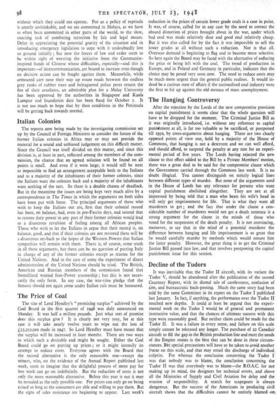The Price of Coal
The size of Lord Hyndley's " promising surplus " achieved by the Coal Board in the first quarter of 1948 was duly announced on Monday. It was half a million pounds. Just what sort of promise does this surplus give ? It is clearly not very 'rosy, for at this rate it will take nearly twelve years to wipe out the loss of £23,250,000 made in 1947. So Lord Hyndley must have meant that the surplus will be increased in later months. There are two ways in which such a desirable end might be sought. Either the Coal Board could go on putting up prices ; or it might intensify its attempt to reduce costs. Everyone agrees with the Board that the second alternative is the only reasonable one—except the miners, who, on the evidence of the Annual Report published last week, seem to imagine that the delightful process of more pay for less work can go on indefinitely. But the reduction of costs is not only the more reasonable alternative. Before this year is out it may be revealed as the only possible one. For prices can only go on being raised so long as the consumers are able and willing to pay them. But the signs of sales resistance are beginning to appear. Last week's reduction in the prices of certain lower grade coals is a case in point. It was, of course, called for in any case by the need to correct the absurd distortion of prices brought about in the war, under which bad coal, was made relatively dear and good coal relatively cheap. But it was also called for by the fact it was impossible to sell the lower grades at all without such a reduction. Nor is that all. Overseas demand is beginning to flag and to become more selective. So here again the Board may be faced with the alternative of reducing the price or being left with the coal. The trend of production in Europe, and in Poland and Germany in particular, indicates that the choice may be posed very soon now. The need to reduce costs may be much more urgent than the general public realises. It would in- deed be a curious state of affairs if the nationalised coal industry were the first to hit up against the old menace of mass unemployment.


































 Previous page
Previous page